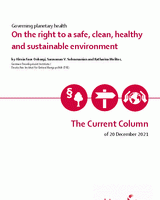Governing planetary health
On the right to a safe, clean, healthy and sustainable environment
Faus Onbargi, Alexia / Saravanan V. Subramanian / Katharina MolitorThe Current Column (2021)
Bonn: German Development Institute / Deutsches Institut für Entwicklungspolitik (DIE), The Current Column of 20 December 2021
On 8 October 2021, the United Nations Human Rights Council passed a resolution recognising the human right to a safe, clean, healthy and sustainable environment. The resolution is the first of its kind. It is about “protecting people and planet” and “protecting the natural systems which are basic preconditions to the lives and livelihoods of all people wherever they live”, as noted by Michelle Bachelet, the UN High Commissioner for Human Rights. It could be an important contribution in helping development actors to set global and national standards to protect people against environmental harm, to provide equal access to environmental benefits, and to ensure a common minimum standard of environmental quality for everyone. While the resolution marks an important step, it leaves several questions unanswered. What does the resolution entail from a planetary health perspective? How can the resolution be governed further? How can it be truly impactful?
First, while the UN High Comissioner has called on member states to “take bold action to give prompt and real effect”, the resolution is not legally binding; how will it be enforced and mandated remains an open question. It is important that the resolution be included in countries’ environmental legislation to fast-track legal processes and foster more ambitious environmental policies. Moreover, the resolution urges states to undertake actions on the presumption that these problems are confined within their national boundaries. A planetary health perspective recognises that environmental problems are increasingly transboundary. Typical examples are the pollution of lakes, rivers, and oceans, forest and forest fires causing haze pollution, acid rain caused by emissions of sulphur oxide and nitrogen oxide, and the impacts of climate change. With these globalised and highly dynamic environmental problems, the role of global trade, multilateral agencies, and transnational cooperation gain more prominence. An example is the 2002 ASEAN Agreement on Transboundary Haze Pollution.
Second, while the business case made in the resolution is particularly noteworthy, several gaps remain. In “Recalling the Guiding Principles on Business and Human Rights, which underscore the responsibility of all business enterprises to respect human rights, including the rights to life, liberty and security of human rights defenders working in environmental matters” the resolution goes beyond its appeal to member states. Businesses rarely prioritise promoting and defending human rights (or in environmental justice more broadly). Therefore states should regulate those businesses working in the most polluting sectors. This way their impacts on planetary health and their often highly unsustainable production and consumption patterns can be addressed. The resolution recognises some important aspects of the human-rights based Sustainable Development Goals (SDGs)– such as achieving basic needs like access to adequate food (in SDG 2) and safe drinking water (in SDG 6). However, it fails to integrate questions around economic growth (SDG 8), infrastructure and industrialisation (SDG 9) and responsible consumption and production (SDG 12).These all have far-reaching consequences for life below water (SDG 14) and life on land (SDG 15). States must address these interlinkages for the resolution to have real impact.
Despite these gaps, the resolution highlights inequality and environmental justice. For example, it explicitly recognises that environmental damage is “felt most acutely by those segments of the population that are already in vulnerable situations, including indigenous peoples, older persons, persons with disabilities, and women and girls.” It also speaks of “present and future generations”, raising the question of how to govern inter-generational environmental justice. An example in Germany brings such governance questions to the fore. A federal court decision in April 2021 mandated the government to expand its plan to reduce carbon emissions by 2050. The decision was a response to youth climate activists citing the human and environmental rights of future generations.
Finally, addressing these environmental injustices requires special action by the countries who abstained. While a core group comprising Costa Rica, Maldives, Morocco, Slovenia, and Switzerland spearheaded the international recognition of the resolution, India, Japan, China and the Russian Federation abstained (43 voted in favour). China and Russia cited concerns over overburdening the Human Rights Council further by including environmental rights. The United States – arguing that not all environmental issues are human rights – was absent from the vote altogether. Geopolitics has an important role to play in securing the health of both people and planet. Indeed, businesses cannot be asked to govern the planet’s health if some of the most polluting countries in the world are not on board. Successful governance of planetary health depends on geopolitics and cross-border implementation. It also demands that special attention be paid to the interlinkages between businesses, environmental justice and inequalities. All of these are crucial to advance the universal right to a safe, clean, healthy and sustainable environment.



